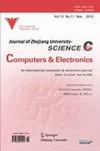A differential control method for the proportional directional valve
Journal of Zhejiang University-Science C-Computers & Electronics
Pub Date : 2014-10-01
DOI:10.1631/jzus.C1400056
引用次数: 9
Abstract
For the proportional directional valve controlled by two proportional solenoids, the normal control method (NCM) energizes only one solenoid at a time. The performance of the valve is greatly influenced by the nonlinearity of the proportional solenoid, such as dead zone and low force gain with a small current, and this effect cannot be eliminated by a simple dead-zone current compensation. To avoid this disadvantage, we propose the differential control method (DCM). By employing DCM, the controller outputs differential signals to simultaneously energize both solenoids of the proportional valve, and the operating point is found by analyzing the force output of the two solenoids to make a minimum variation of the current force gain. The comparisons of the valve response characteristics are made between NCM and DCM by nonlinear dynamic simulation and experiments. Simulation and experimental results show that by using DCM, the frequency response of the valve is greatly enhanced, especially when the input is small, which means that the dynamic characteristics of the proportional valve are improved.比例换向阀的差动控制方法
对于由两个比例电磁阀控制的比例换向阀,正常控制方法(NCM)一次只给一个电磁阀通电。比例电磁阀的非线性,如死区和小电流下的低力增益等,对阀的性能影响很大,这种影响不能通过简单的死区电流补偿来消除。为了避免这个缺点,我们提出微分控制方法(DCM)。控制器采用DCM输出差分信号,同时给比例阀的两个螺线管通电,通过分析两个螺线管的力输出,找到工作点,使电流力增益变化最小。通过非线性动态仿真和实验,比较了NCM和DCM的阀响应特性。仿真和实验结果表明,采用DCM后,比例阀的频率响应得到了极大的增强,特别是在输入较小的情况下,比例阀的动态特性得到了改善。
本文章由计算机程序翻译,如有差异,请以英文原文为准。
求助全文
约1分钟内获得全文
求助全文
来源期刊
自引率
0.00%
发文量
0
审稿时长
2.66667 months

 求助内容:
求助内容: 应助结果提醒方式:
应助结果提醒方式:


